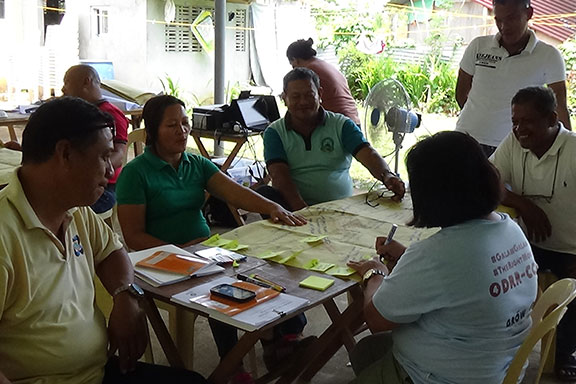STEP 4: ALIGNING FINDINGS WITH OPPORTUNITIES
Objective: To turn the findings and ideas of the Knowledge Group into actions to build resilience.
Output: This step is about dialogue and consensus building to plan future interventions. Key outputs could include follow-up meetings scheduled, commitments from key individuals on actions and/or a to-do list with names attached.
‘It was like a dream having the opportunity to sit around this group of so varied people. When they contacted me on the phone to invite me to this exercise I thought this wouldn’t take us anywhere, but now I believe it will.’Knowledge Group participant from a Vulnerability and Risk Analysis in the Bobirwa sub-district, Botswana November 2015
This step is about exploring existing work, policies, networks and partnerships, funding and civil society spaces where you can get support to implement the proposed activities, rather than developing a stand-alone ‘VRA action plan’.
This could involve:
- Incorporating the proposed activities in upcoming NGO or government initiative funding opportunities.
- Aligning them to government planning cycles, or using the information gathered in advocacy work to raise awareness of local issues amongst duty-bearers.
- Integrating the ideas into community-level action plans or livelihood-based group activities.
DAY 2 TASK – PART 3
Time: 2 Hours
This task can be done in a number of ways, depending on the size of the area represented by the Knowledge Group, pre-existing knowledge of current opportunities and/or the willingness of decision makers to engage. It will broadly involve:

Oxfam partners and community representatives discuss how to implement their ideas. Guiuan, Eastern Samar Philippines April 2016. Photo: J.Fullwood-Thomas.
Regrouping Knowledge Group participants so that that those living or working in the same geographical area, or tied to the same governance structure (e.g. municipal or district), work together. They will know the opportunities, entry points and key decision makers to target in order to make progress.
Encouraging participants to discuss the ideas from the workshop, identify where these align with other activities or opportunities, and what actions would be needed to include them. This is also about increasing the accountability of duty-bearers, and enabling more equitable and inclusive planning processes.
Returning to plenary to present the respective group plans. This can also act as an opportunity to learn from each other and/or request capacity-building support or exchange visits.
Please note that this step does not deliver an ‘end product’; rather it establishes multiple options for future activities. Follow-up conversations should be scheduled to support the development of actions points. Before the workshop, it is therefore important to identify allies, influencers and partners.
